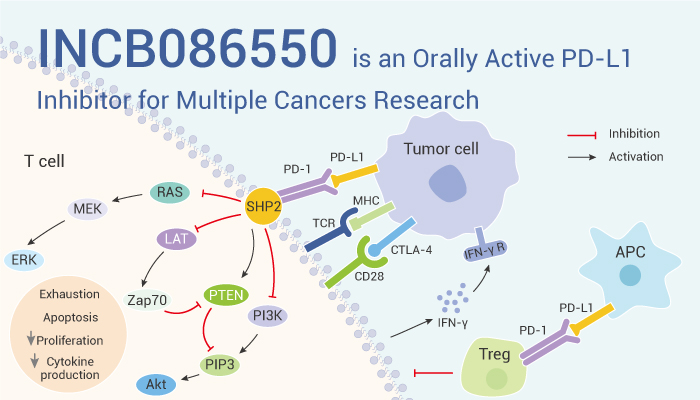Programmed death-1 (PD-1) is a cell surface receptor that functions as a T cell checkpoint and plays a central role in regulating T cell exhaustion. Meanwhile, programmed death-ligand 1 (PD-L1) is a 40 kDa type 1 transmembrane protein. PD-1 is a member of a family of immunoglobulin domain (Ig) co-receptors that modify the outcome of activation of the T cell receptor by an antigen-presenting cell (APC) or infected target cell. PD-L1 is widely and constitutively expressed on both hematopoietic and nonhematopoietic cells; e.g., naive T and B cells, vascular endothelial cells, and pancreatic islet cells, whereas PD-L2 is exclusively and inducibly expressed on professional APCs. PD-1 is activated by the engagement of its ligands PDL-1 or PDL-2. Specifically, PD-1 receptor delivers inhibitory checkpoint signals to activated T cells upon binding to its ligands PD-L1 and PD-L2 expressed on antigen-presenting cells and cancer cells, resulting in suppression of T-cell effector function and tumor immune evasion. Inhibiting the PD-1/PD-L1 pathway is an attractive strategy for tumor immunotherapy.

INCB086550 is a potent, selective, and orally active PD-L1 inhibitor, which binds with high affinity to PD-L1.
INCB086550 is selective for PD-L1 over PD-L2 and, owing to the single amino acid change at residue 115. In addition, INCB086550 interacts with human, cynomolgus, and rat but not mouse PD-L1. In vitro, INCB086550 selectively and potently blocks the PD-L1/PD-1 interaction, induces PD-L1 dimerization and internalization. Specifically, INCB086550 promotes the dimerization of cell-surface PD-L1 and induces PD-L1 entry into Golgi vesicles then traffick to the nucleus. Therefore, the ability of tumor cells to initiate the immunosuppressive effects of the PD-1 pathway in T cells can be eliminated. Moreover, it induces stimulation-dependent cytokine production in primary human immune cells. Importantly, in vivo, INCB086550 reduces tumor growth in CD34+ humanized mice and induced T-cell activation gene signatures. Thus, INCB086550 has biological properties similar to PD-L1/PD-1 monoclonal antibodies and may represent an alternative to antibody therapy. INCB086550 shows antitumor efficacy, with increased immune activation and tumor growth control.
Taken together, INCB086550 is a selective and orally active PD-L1 inhibitor with antitumor efficacy.
References:
[1] Koblish HK, et al. Cancer Discov. 2022 Jun 2;12(6):1482-1499.